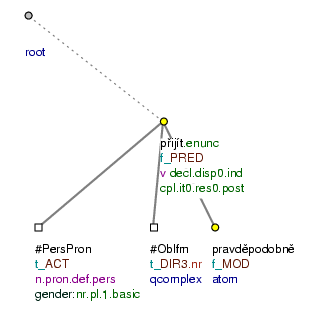The modality of events (and states) is expressed by means of modal verbs; in such cases the information on modality is carried by the deontmod grammateme value (see Section 5.10, "The deontmod grammateme (deontic modality)"). However, modal meanings can also be expressed by certain particles and adverbs. We do not distinguish the individual meanings of such words (necessity, possibility, probability) - we represent all of them as modifications with the functor MOD.
NB! For the syntactic nature of the MOD modifications see Section 11.1.3, "The semantic scope of modifications with the functors MOD and ATT".
Forms. The basic forms of MOD modifications are:
-
adverbial and particle expressions.
Examples:
Pravděpodobně.
MODpřijdeme. (=lit. Probably (we) will_come.) Fig. 7.44Asi.
MODpřed týdnem jsem dostal dopis od K. Řeháka z Prahy. (=lit. About ago (a) week - (I) received (a) letter from K. Řehák from Prague.)Rozhodujícím úkolem nového vedení je konsolidovat společnost, která je bezesporu.
MODperspektivní a životaschopná. (=lit. (The) main task (of) (the) new management is to_consolidate (the) company that is surely successful and prosperous.)Snad.
MODi proto jsou pokusy o artikulaci odlišných názorů tak nevěrohodné. (=lit. Perhaps also therefore are (the) attempts to articulate different opinions so spurious.)Starý pán se galantně skloní k momentálně možná.
MODnejvlivnější ženě planety. (=lit. (The) old gentleman - gallantly bows to (the) presently perhaps most_influential woman (of) (the) planet.)Vím jistě.
MOD, že Praha mě poznamená. (=lit. (I) know for_sure that Prague me will_affect.)Armádní špičky si prý.
MODod něj udržují odstup. (=lit. (The) army elite supposedly from him keep distance.)Vedlo by to zřejmě.
MODke zničujícímu rozkolu. (=lit. Would lead it apparently to (a) devastating split.) -
prepositional phrase.
The most common forms:
s+7 Limit bude s největší pravděpodobností zrušen. (=lit. (The) limit will_be - most probably cancelled.) v+6 Takoví pracovníci v zásadě neexistují. (=lit. Such workers in principle do_not_exist.) It is typical of the modifications with the functor
MODexpressed by prepositional phrases that they have - to a certain degree - a fixed lexical content.
Agreeing form of an adjective. With nouns denoting events (nouns ending with -ní and tí; see also Section 2.4.3.3, "Functors assigned to the non-valency modifications of nouns referring to events"), MOD modifications can also be expressed by an agreeing form of an adjective (only marginally).
Examples:
pravděpodobné.MOD ukončení závodu (=lit. (a) probable end (of) (the) race)
možné.MOD selhání (=lit. (a) possible failure)
Borders with other functors (particularly the functors MANN and EXT). Certain adverbs and particles (e.g. snad (=hopefully), prý (=supposedly)) have a very specific semantics: they only express modal meanings (therefore the nodes representing these expressions always have the MOD functor). Other adverbs and particles can also have other meanings, besides the modal ones (MANN, EXT etc.). In a particular construction, it is necessary to distinguish these meanings. Cf.:
-
Mysleli to doopravdy.
MANN(=lit. (They) meant it really.) -
Doopravdy.
MODse to stalo. (=lit. Really REFL it happened.)
Border with the RHEM functor. Modifications with the MOD functor can border on rhematizers. For details see Section 6.1.2, "Homonymy: rhematizer - modal expressions (ATT and MOD)".
